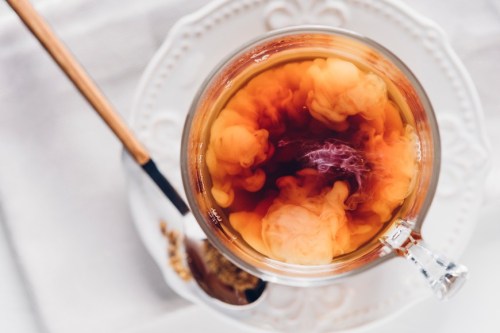Black tea is emerging as a gut-health hero—here’s what you need to know
Research shows black tea may support weight loss and help prevent diabetes and obesity. But does that mean you should stop drinking green tea? Here's everything you need to know.

Among all the types of tea, green tea tends to get the most love from the wellness crowd. And it’s true that green teas of all varieties—including matcha—are full of benefits, from preventing heart disease to boosting cognitive function. But when it comes to gut health, it turns out that there might be a better brew to sip.
Researchers from the University of California at Los Angeles recently found that black tea is linked to improving gut function and bringing balance to the microbiome—the colony of good and bad bacteria that lives in your digestive tract. They also discovered that the beverage helps support weight loss and may prevent diabetes and obesity. In other words, major benefits.
To learn a bit more about how black tea affects the microbiome, especially in relation to green tea, I called Simon Cheng, who studies the health benefits of tea for a living. In addition to being the CEO of Pique Tea, Cheng sits on the Nutrition Round Table at Harvard’s T.H. Chan School of Public Health, which is currently examining over 2 million fecal samples to learn more about the microbiome—including how the polyphenols in tea affect it. He also studied Chinese herbal medicine at Tsinghua University and Chinese history at Harvard. So Cheng knows a lot about tea and gut health alike.
Here, he explains the black tea-gut connection that’s only starting to be examined by scientists—and presents some surprising intel that may cause you to start alternating your morning matcha with cups of English Breakfast.
Keep reading to find out why drinking black tea may be great for your gut health.

How black tea compares to green tea
As Cheng explains it, both black and green teas are good for you—they just have different micronutrients that benefit the body. “The polyphenols in black tea are completely different than the polyphenols in green tea,” he explains. The polyphenols in green tea are called catechins, which have been linked to preventing heart disease and stabilizing blood sugar levels. Black tea is very low in catechins because of how it’s made, but Cheng says that doesn’t mean it’s lacking in health benefits.
“The reason catechins are more applauded and understood is because a lot more studies have been done on them,” he says. “And the reason for that is because green tea has been dominantly consumed in Japan, where many of the studies are based.” Cheng explains that during the black tea fermentation process, the catechins are metabolized into flavonols—another type of polyphenol. “Even though black tea has been consumed for centuries in China and Europe, scientifically, we’re still at the beginning stages of understanding flavonols,” he says.
In China, it’s common for black tea to be sipped on while eating dim sum, because the digestive qualities are inherently understood in Chinese culture. But here in the West, scientists are just starting to pay attention to flavonols’ effect on the microbiome.

The scientific evidence behind the digestive benefits of black tea
Here’s what researchers, like the ones who conducted the new UCLA study, are finding out about black tea and gut health. “The polyphenols in black tea are not as easily absorbed [as green tea], so they stick around in the microbiome longer,” Cheng explains. During this extended stay in the gut, they’re able to make a pretty major impact. “What the UCLA researchers found was that the polyphenols in black tea have a direct effect on certain types of bacteria growth in the body, which has been linked to leaner body mass,” Cheng says.
He adds that it’s not uncommon for people to experience digestive upset when drinking green tea, and if this is something you’re experiencing, switching to black tea might be a safer bet. “Green tea is a diuretic, and so sometimes it can cause a feeling of bloatedness,” he says. “The black tea has a very direct impact on digestion, which helps prevent any sort of feeling of bloatedness.”
The best part of this new research is that no matter what shade of tea you prefer, you’re benefiting your body in some way. But armed with the knowledge of exactly how different polyphenols affect the gut, you can take a more targeted approach to your beverage selection.
Here’s how the caffeine in black and green teas affect the body—and how bad of a crash you can expect. Don’t feel like catching a buzz? You can also get the benefits of tea from skin care products.










